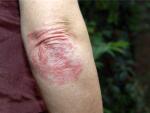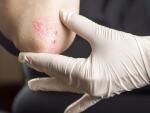This article explains psoriasis diet approaches, including foods to include and limit and other nutritional strategies for psoriasis.

Anti-inflammatory diets may help manage psoriasis because the condition can cause chronic inflammation.
A
Others may eat foods higher in fats and lower in fiber. Researchers say these eating methods are associated with the frequency and severity of psoriasis episodes.
Some
A suitable eating plan for psoriasis may help alleviate symptoms and lower the risks for other conditions, such as cardiovascular disease.
Further research is needed
Though an anti-inflammatory eating plan may be helpful for psoriasis, more research on the effects is needed. Each person may react differently to a specific eating plan.
Contact your doctor or a licensed dietitian before significantly changing the foods you eat.
The following are some anti-inflammatory food groups to consider if you have psoriasis.
Whole fruits and vegetables
Fruits and vegetables high in antioxidants, fiber, and other nutrients help reduce inflammation.
Options can include:
- green leafy vegetables, such as spinach
- cruciferous vegetables, such as cauliflower, cabbage, and broccoli
- root vegetables, such as beets, onions, and turnips
- tomatoes
- potatoes and sweet potatoes
- olives and extra virgin olive oil
- fruits with pips or stones, such as apricots, cherries, and peaches
- citrus fruits, such as lemons, oranges, and grapefruit
- pomegranates
- grapes
- apples
Whole grains
Whole grains can also be rich in plant compounds and have anti-inflammatory and antioxidant benefits.
Examples of whole grains products include:
- brown basmati, wild, and black rice
- buckwheat
- quinoa
- rye
- barley
- bulgur
- spelt
- oats and rolled oats
- muesli
To include whole grains in your meal plans, look for foods labeled “whole” or “whole grain” such as:
- bread
- rice
- pasta
- tortillas
Omega-3s
Omega-3s are an unsaturated fatty acid that
- salmon
- sardines
- herring
- pilchards
- trout
- mackerel
- whitebait
Omega-3s are also present in plant-based foods, such as:
chia Trusted Source FoodData Central Highly respected food and nutrition database from the United States Department of Agriculture, Go to source seeds- flaxseed
hemp Trusted Source FoodData Central Highly respected food and nutrition database from the United States Department of Agriculture, Go to source seed- algal oil
- perilla oil
Nuts, seeds, and legumes
Nuts, seeds, and legumes
Examples include:
- walnuts
- hazelnuts
- almonds
- pistachios
- flax seeds
- pumpkin seeds
- grape seed
- beans, peas, and pulses, such as:
- lentils
- split peas
- garbanzo beans
- kidney beans
Lean proteins
Some protein foods may be less inflammatory than others, such as:
- poultry, such as lean cuts of chicken or turkey or cuts without skin
- oily fish
- soy and soy products, such as tofu and tempeh
- nuts, seeds, and legumes
The following are foods to consider limiting if you have psoriasis.
Alcohol
According to a
If you are having difficulties reducing your alcohol intake, contact your doctor for help.
Refined grains
Refined grains may be lower in nutrients and
The effects of diets can vary
Some pro-inflammatory foods may be fine in moderation for some people. Others may not be able to tolerate them.
Always talk with a doctor before making substantial changes to the foods you eat or if you have new or changing symptoms after dietary changes.
Added sugars
Added sugars in foods can also be inflammatory and worsen psoriasis.
Examples of foods that may contain added sugars include:
- bread and bakery foods such as cake
- beverages such as soda and juice
- candy
- some savory foods, such as restaurant meals and preprepared foods and sauces
Red and processed meats
Red and processed meats may increase signs of inflammation in the body. Examples include:
- beef
- pork
- lamb
- deli meats
- sausages
- bacon
- jerky
Some fats
Examples of inflammatory fats include:
- saturated
- trans
- partially hydrogenated vegetable oils
Inflammatory fats may be
- meat, dairy, and other animal products
- fried foods
- preprepared baked foods such as frozen pizzas and cakes
- margarine and cooking fats such as lard
- coconut and palm oil
Foods high in sodium
A high sodium or salt intake may contribute to inflammation and cardiovascular disease.
Examples of high sodium foods include:
- processed or preprepared poultry, such as rotisserie chicken
- fast food, such as burgers, pizza, and burritos
- deli meat
- boxed and frozen meals
- soups and sauces
- savory snacks, such as chips or popcorn
- canned foods, including canned vegetables
The American Heart Association recommends a maximum limit of
Check food labels for sodium levels or choose products low in sodium. Rinsing canned foods under running water may also help wash off some of the excess sodium.
People with psoriasis may be
Some researchers
However, further research is needed to understand the effects, including whether gluten-free diets may benefit people with psoriasis but without gluten sensitivities.
Imashi Fernando, M.S., R.D.N., has reviewed the following frequently asked questions.
Are eggs good for psoriasis?
Eggs may have both anti-inflammatory and pro-inflammatory qualities. However, there is little research into the overall effects of eggs on psoriasis.
Eggs are high in nutrients and can be included in a balanced and anti-inflammatory eating plan. Still, everyone may react to eggs differently, and clinicians recommend eating them in moderation.
Contact your doctor for advice.
Will taking vitamin D help psoriasis?
Vitamin D may help some people with psoriasis. This is because some researchers say vitamin D deficiency may be associated with psoriasis and its severity.
A
Though there is no specific psoriasis diet, some say an anti-inflammatory eating plan may help alleviate the frequency and severity of symptoms and flare-ups.
An anti-inflammatory eating plan includes whole grains, lean protein, fresh fruits, vegetables, and legumes. It may also limit alcohol, red meat, and processed foods.
However, not everyone may react to an anti-inflammatory eating plan the same way. What may be effective for one person may not be effective for another.
Always contact a doctor before changing your way of eating substantially or for any new symptoms following dietary changes.










